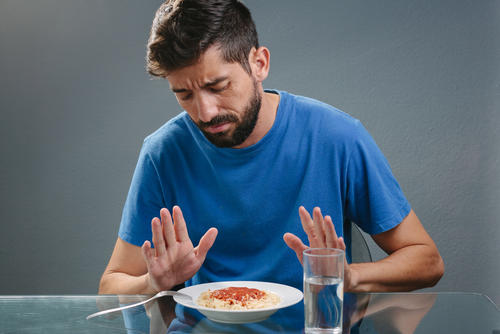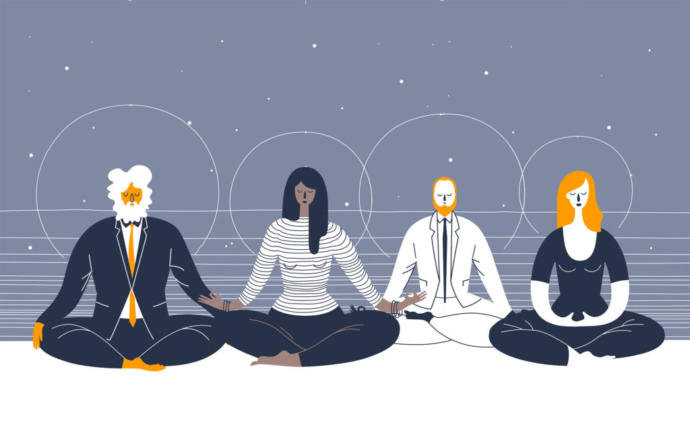How to manage your eating disorder during quarantine?
How should you react to your anxieties when you are stuck at home with a full fridge?
As an ED specialist, I will give you some tips to help you.
Eating Disorders (ED): An additional stress during quarantine

For people with an ED, being stuck at home with a fridge full of food is a real challenge. Anxiety sets in, because we can no longer put in place the tricks that usually allow us to keep our fears and our compulsions at bay.
There is no escape, we are facing a source of food but also facing our compulsions, defenseless. We can clearly see how, at that time, the body becomes an enemy. This body that sends us signals of hunger, that gets bigger even if we do everything to restrict it, and that is always present when we would like to forget about it. We have to make a plan of attack to "control" it.
And there begins a vicious cycle that will no longer stop: you restrict yourself, you ignore the signals your body sends you, you binge eat* the entire cake that you were trying to ignore for a few hours, you feel guilty, and you restrict yourself again.
* Binge eating refers to the absorption of a large amount of food in a short time accompanied by a loss of control.
Where do these impulses come from?

Food compulsions are often symptomatic of two types of eating disorder: bulimia nervosa and binge eating disorder:
- Bulimia nervosa is defined as episodes of rapid and uncontrolled absorption of large quantities of food under the influence of a stress felt as more or less irrepressible, and typically ending in induced vomiting.
- Binge eating disorder is defined as recurrent episodes of binge eating, without vomiting or elimination practices, which can lead to obesity.
These two disorders have in common recurrent food compulsions which correspond to the following characteristics:
- eating much faster than usual
- eating until you feel uncomfortably full
- eating large amounts of food without feeling physically hungry
- eating alone, because you feel embarrassed by the amount of food you eat
- feeling disgusted with yourself, depressed or very guilty after eating too much
These disorders have a saving function for the individual's psychic apparatus, it helps them to fight against their anxieties. This saving function is so powerful and it helps to contain such important anxieties that it is difficult to get rid of it.
These compulsions often serve as emotional discharge, meaning that they express through the body, emotions that overflow us and that we can not process.
How not to give in to urges more than usual?

In this particularly anxiety-provoking context of quarantine, our food compulsions may be more present than usual. Many try to control these impulses so as not to let them win the battle and not to sink into crises of "binge eating" and self-esteem.
However, through this process, a new battle begins with our own body and our own emotions. The purpose of this battle is to silence these negative emotions that give our body the urge to eat.
This will prevent a part of us from expressing ourselves, and therefore will result to a relationship of mistreatment with ourselves. The more active this process is, the more we will prevent our emotions from being expressed, the bigger our discomfort will be and the more the food compulsions will be present.
For people with EDs, dietary restrictions and control can be a double-edged sword: first experienced as protective, then the control revives our anxieties and therefore our compulsions. Does this mean that you have to give in to all your impulses so that you are no longer anxious? Not really, since, as we have seen, these impulses express uneasiness and harm our body (vomiting, nausea, bloating, pain).
We have to learn how to listen to these impulses, to take them into account, without giving in to them. It is a question of setting up a benevolent listening towards your body, letting it express itself to avoid loss of control.
Mindfulness meditation: a way out of this vicious cycle

I'm being vague on purpose because this whole process is very personal, it depends on the interiority of each one. As a psychologist, my posture is not to say what to do to get better, but to help find the solution that is most suitable for everyone.
There is no magical recipe. It’s not about changing who you are. It's about being able to accept yourself and living well with what you are. On the other hand, there are some options to explore in order to be able to put in place this sympathetic listening of yourself in this period of quarantine.
Mindfulness meditation is an interesting option. It is about observing our feelings in the present moment without devaluing, or without comparing ourselves to others, which allows not to filter the feelings that reach our consciousness.
This is a time when the goal is not to be demanding with oneself, but on the contrary to accept all our emotions, including those that we would prefer to ignore.
In everyday life, we rarely take the time to start this process, but right now it may be easier to make time for ourselves. We can thus listen to our own emotions, let them express themselves without judging or putting them aside. Sometimes it's a complicated process.
Intuitive eating: differentiate between need and compulsion

You can also practice eating intuitively. For people with EDs, it can make all the difference. If we manage to do it, we can avoid giving in to our impulses since we take the time to ask ourselves if we agree with what we are going to eat, if it pleases us.
And sometimes we can realize that what we eat does not make us particularly happy or that after eating it we feel bad. Maybe that means it was more of a compulsion than a treat or a need. Intuitive eating is not about eating only "healthy" food. To achieve intuitive eating we should start by getting rid of food labels: "healthy", "unhealthy", "bad", "good". Food is either high or low nutrient dense. And both are okay. Our body needs both.
One of the biggest fears around intuitive eating is binge eating, and eating only "unhealthy" food. Your body is smart, trust it! At the beginning, there is a chance that you will overeat, but this is not a result of intuitive eating. It is a result of years and years of restriction. After a while, you will learn to listen to your body. By removing labels and respecting your cravings, your body will start to make its own choices. You will be surprised by how beneficial these choices are.
Keeping an emotional journal

Sometimes it’s hard to listen to yourself without support. Writing can be a good way to make your emotions more concrete. You can, for example, keep an emotional journal. It is about writing our emotions in response to a situation so that we can observe and analyze them.
For example in the case of EDs: "I ate an entire box of cereal because I am in quarantine and I did not think of buying other snacks for small cravings in the afternoon. I felt bad, I had the feeling of having eaten too much and not loving myself. "
After this observation, we can make a suggestion, a way to manage this situation like: "Buy snacks that I can eat in reasonable quantities, which do not wake up my food compulsions".
Or also: "I was anxious this afternoon because telecommuting really puts me under pressure. I can do a meditation session before eating so I can try to calm my emotions. ”
Of course, we can also relate our positive emotions of the day and analyze them in the same way.
This quarantine will of course end one day . And even if you gained weight during this period or if you had more food compulsions than usual, you will be able to analyze this moment as a real challenge which imposed itself on you. You survived this pandemic and you survived this difficult period.
And even if you feel guilty, you would have done your best to respect your body in these stressful times.
Most Helpful Opinions